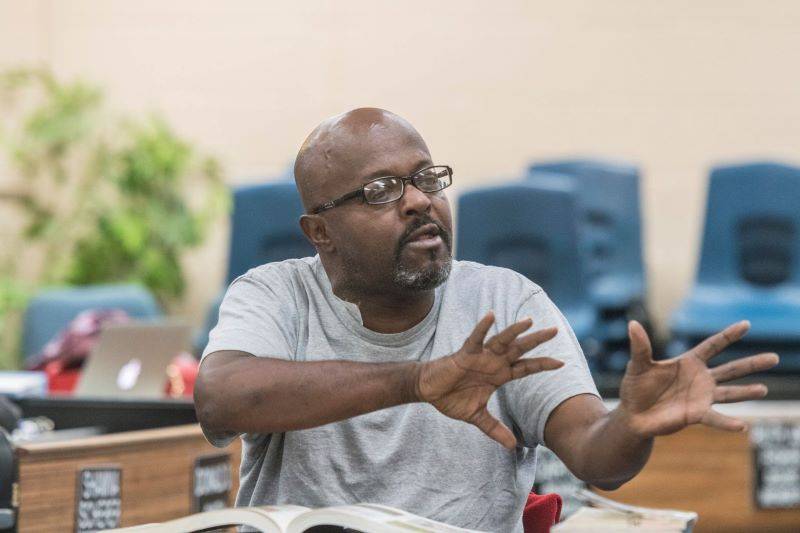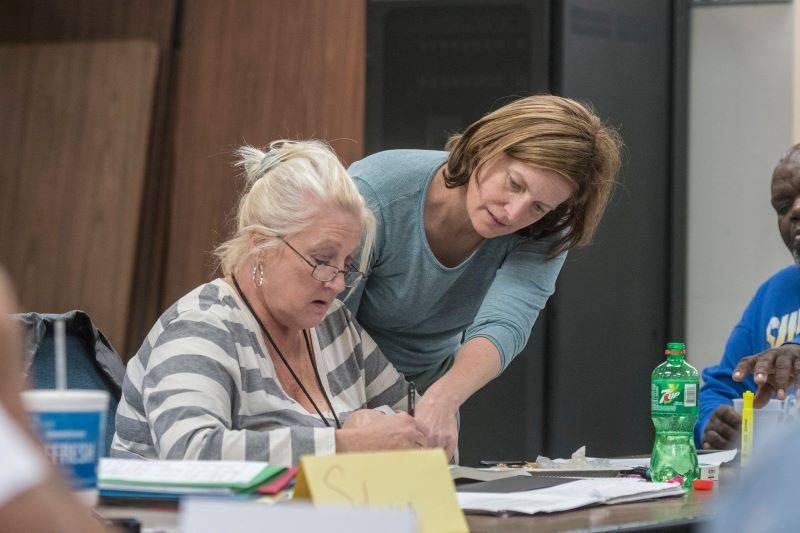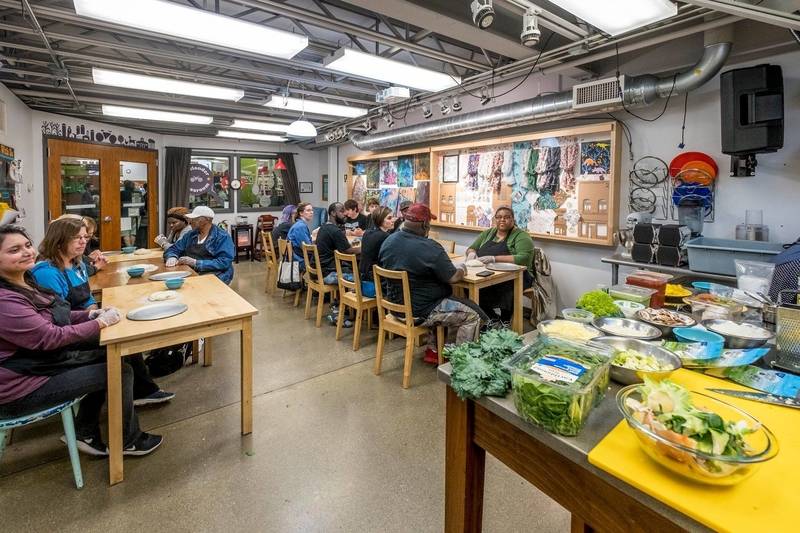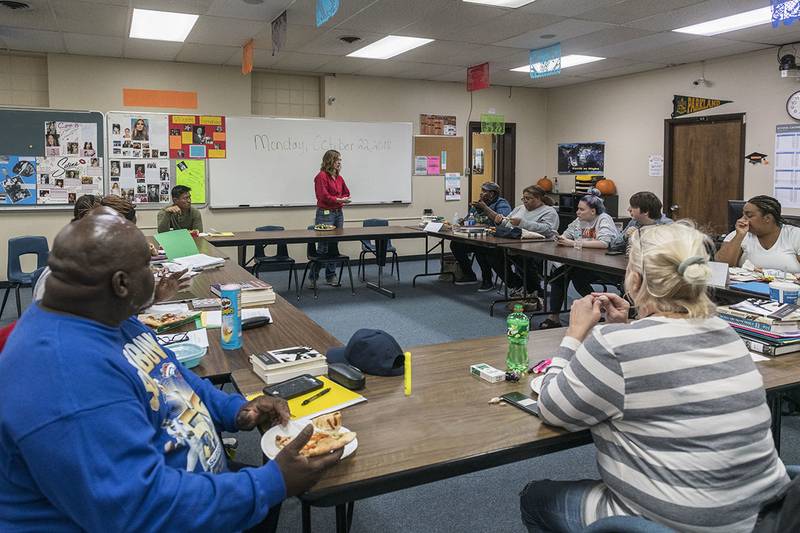The Odyssey Project, part of Illinois Program for Research in the Humanities, offers adult humanities courses for college credit in the Champaign-Urbana community and strives for promoting educational access to all. Every Monday and Wednesday, students meet for 90 minutes of Art History/Philosophy, followed by dinner, then Critical Thinking and Writing. The spring semester will focus on Literature and U.S. History as well as Critical Thinking and Writing.
The project is part of a larger sense of urgency and obligation within the university to do responsible and collaborative community engagement rooted in convictions, in this case, about the power of teaching to transform people’s lives.

Alaina Pincus, Assistant Director of Education and Outreach for IPRH, says the Odyssey students have bonded and feel a strong sense of community with one another and support one another inside the classrooms during discussions. Students are encouraged to do activities, such as freewriting and sharing what they wrote or reading around in groups. The project allows individuals to feel a sense of support with the personal experiences they share and encourages bravery in opening up themselves to sharing.
I spoke with Pincus and Antoinette Burton, Director of IPRH, about the project’s success throughout the past 15 years since it first started in Champaign-Urbana.
Smile Politely: Can you briefly describe the mission and vision of The Odyssey Project?
Alaina Pincus: The Odyssey Project is a free college program for income-eligible adults without previous access to college education, who are looking to go to school. Those who are at or below 150% of the federal poverty guidelines and do not have a bachelor’s degree or higher, qualify for project. We offer free college credits through the U of I. They are specifically humanities-based courses, because those courses are where you build really important critical thinking skills and ways to understand your community and the world around you in your own experiences. A lot of our students go on to Parkland or other schools to then further pursue their college education. We’ve even had students that have only needed a few credits to completely their degree, and they did that through the Odyssey Project.
The Odyssey project is starting a new phase. In the past we were affiliated with the Clemente Course, which started in the 90s, and that was very much about bringing college education to local communities, who for one reason or another did not have access, and that slowly grew and developed into a nationwide program. This year, we have a Mellon grant and we brought it specifically to U of I. Instead of Bard College credits, you get U of I credits. We are working to build pathways for transitioning into the U of I, whether that’s through Parkland and Parkland Pathway program, or whether that’s through some other Illinois Promise or Illinois commitment. Most of our students are in their mid to late 30s and are usually aged out of things like the Illinois commitment.
We recruit in the spring and summer for the fall semester. We did it online this year as a supplement to our previous efforts — we have a coordinator for student experience and an academic advisor who really managed a lot of that, Valerie O’Brien, along with public humanities fellow and our critical thinking and writing TA Meghann Walk. They did a lot of beating the pavement, talking to people, and making connections among community organizations. We were lucky that this year in that we received over 80 applications for a class of 20. We held information sessions so that people knew what they’re getting themselves into, because if you’re a working adult or you have kids or both, it is a commitment to go back to school, even in a model like the Odyssey Project, which is a lot friendlier to working students. We offer evening classes, we pay for all the textbooks and provide meals, and really try to build a community amongst our students. But really the most important part is that you have to show up if you want to be involved. The idea is to make it possible for people to attend the classes, and to remove the kinds of barriers that would cause them to drop out or step away from the program because we want people to succeed.
Antoinette Burton: The Odyssey Project has been running here for about 15 years modeled on this national example, Clemente Course, which has its local variations everywhere. It had been running on a shoestring for a long time with the support of various units on campus and most of that support went to the actual delivery of the courses to pay the faculty teaching the courses.
It was not necessarily a sustainable model, either financially or just in terms of execution. It was not reaching the people it should and needed more resources to help students succeed the way we wanted to, so we got a grant from Andrew W. Mellon, biggest funder of humanities, for five years to run Odyssey at capacity with proper resources. That enabled us to do more than just the bare bones.
It enabled us to hire Alaina, who has a Ph.D. in English and is the Assistant Director for Education and Outreach. It also allowed us to hire Valerie, our student experience coordinator, and allowed us to employ a graduate student who is interested in public humanities who can participate in the support of Odyssey as it unfolds in the nightly classes but also connects it to her own research.
Provided in addition to the transportation, meals, and books is an artist in residence each semester — so students will have the opportunity to work with a local artist, Kim Curtis, in the fall and Audrey Petty, who actually runs Odyssey in Chicago. She used to be a creative writing professor here.
It is also important to recognize that we went to Dean of College of LAS, Feng Sheng Hu, and said the Bard model is not great and would really like LAS to pitch in and give us free tuition and he did not hesitate to help.
Pincus: The College of LAS contributions really helped us be able to offer courses because they are offered through the LAS course number. IPRH doesn’t actually offer classes, so technically we had to get the credits through somewhere else and LAS, as our partner, worked really hard to make sure courses were approved and on the record. When students graduate from Odyssey Project, they will have humanities credits, assuming they took both semesters, on their Illinois transcript, which can be taken with you wherever you go.
Another important aspect is being able to use a computer to do your course work. It is a really important skill to have, and depending on a student’s experience, they may or may not have had access to or had been used to using computers in the past. Because they have not had access to computers, typing up an essay can be a challenge. Having a computer available eases those challenged and gives students the opportunity to better understand and learn those computer skills. At least for the Odyssey Project, they have access to laptops every Monday and Wednesday that they attend class.

SP: Are there any struggles or challenges that Odyssey Project students tend to face in the classroom?
Burton: I would say the struggles that Odyssey students have parallel struggles that all students have. They are doing a million things and students, no matter where they are, typically are working and life happens. But what is amazing about the Odyssey students —there is an energy, commitment, and conviction that even most undergraduates don’t necessarily have. One of the things I love most about this experience is hearing students talk about their love of Philosophy, or their interest in Art History, or their confusion about regular history, or their intimidation by literature, and yet their incredibly engaged relationship to all of those subjects.
Pincus: These are people who want to be there and don’t just want to receive credit or a degree. And while they recognize that their job prospects could be improved by a college degree, I think it is more than that for a lot of them. When you work day in day out, trying to take care of your family — whether it’s kids, parents, siblings — you’re trying to keep life on a smooth track and sometimes lose touch with the things that give you joy. What we find with these students is that this helps feed that need to feel connected to something greater: to deeper thinking, to arts and culture, to other people who don’t just want to talk about what they did today but have a conversation about being a person and knowing something and think critically about the world around them.
Burton: On campus, at least in the humanities, we talk a lot about trying to make undergraduate students lifelong learners. The Odyssey Project students really are the lifelong learners. These individuals are the ones that against all odds have come back or restarted because they feel that hunger to learn.

SP: And how can we, as a community, bring more awareness about the Odyssey Project and continue to expand and strengthen the program?
Pincus: This is the community facing work that the humanities, in particular, are known to do. The Odyssey Project is just one example of what a university can do as a member of its larger community. What we want as partners with people of Champaign-Urbana is to come together and help make our communities better. We want people to know if they qualify and want people to send individuals to us that are in the position to qualify. We want individuals to come to student research week. Something certainly amazing that can help strengthen the program would be an endowment — whether it is an endowment for the Odyssey Project, IPRH, an internship, or instructors — to give to the project and be able to sustain it locally with funding through the university and community, as opposed to grants that dry up and end. Being able to sustain and expand the project in the next few years depends on the community and our efforts to maintain certain opportunities is definitely a top priority for continuing to expand the project in the future alongside community and university partnerships.
Burton: In addition to wanting to get the word out and reach people for who this might be an attractive opportunity if they qualify, we are also interested in getting in front of civic groups and community organizations between now and next spring. We can make presentations to any group so when recruitment for next year happens we will have a huge backlog of interest and reach out specifically to those groups of people. We want to make connections with those in the community who would like to hear ahead of the next recruitment cycle about who we are and what we are trying to do.
*****
You can find out more about The Odyssey Project by checking out their website or following them on Facebook.
Photos from the Odyssey Project Facebook page








